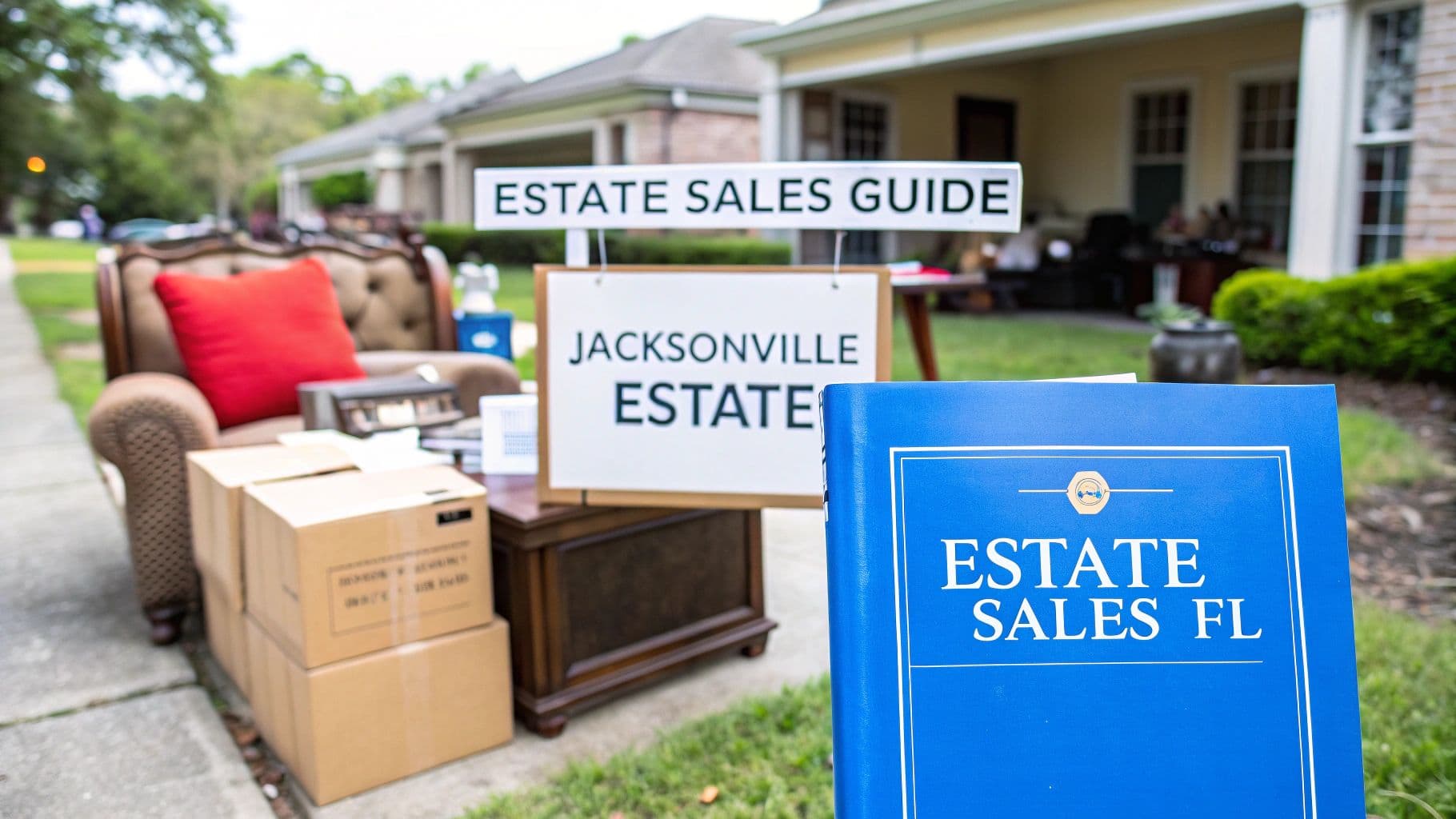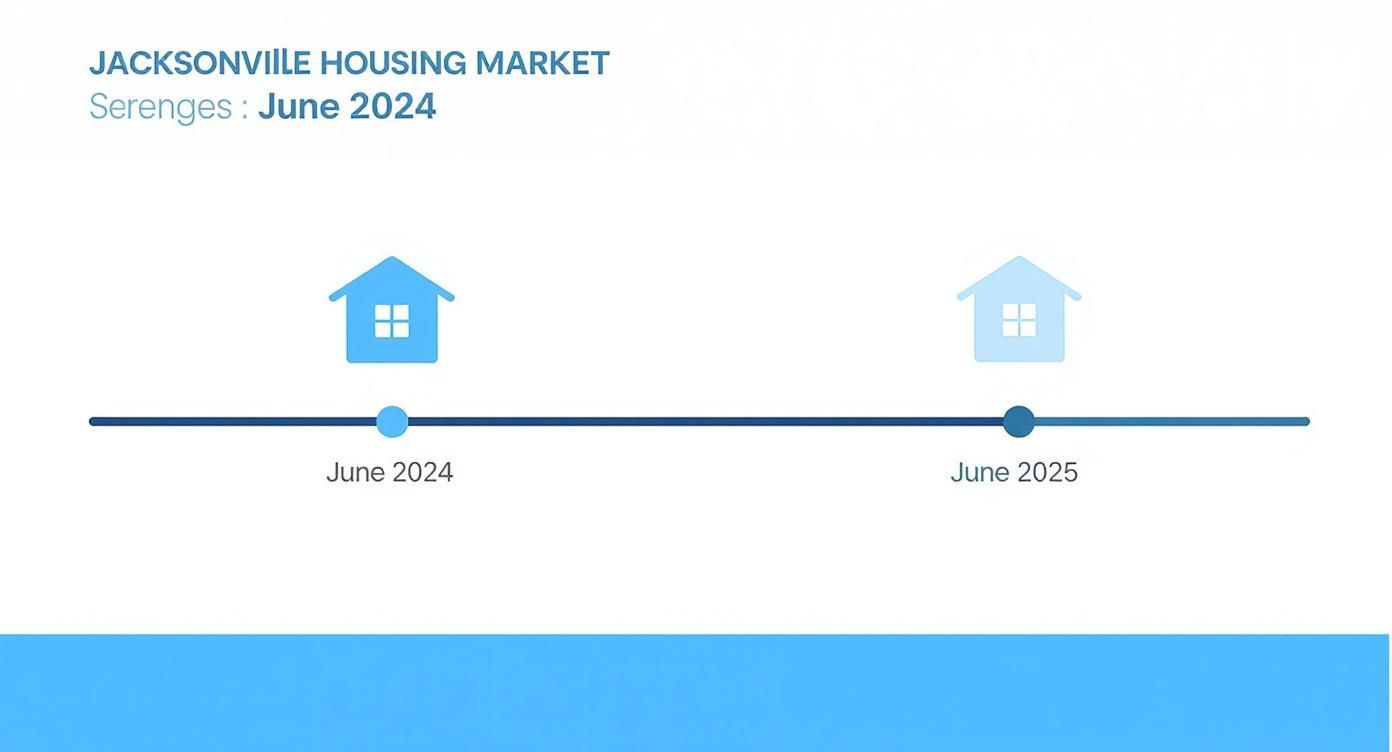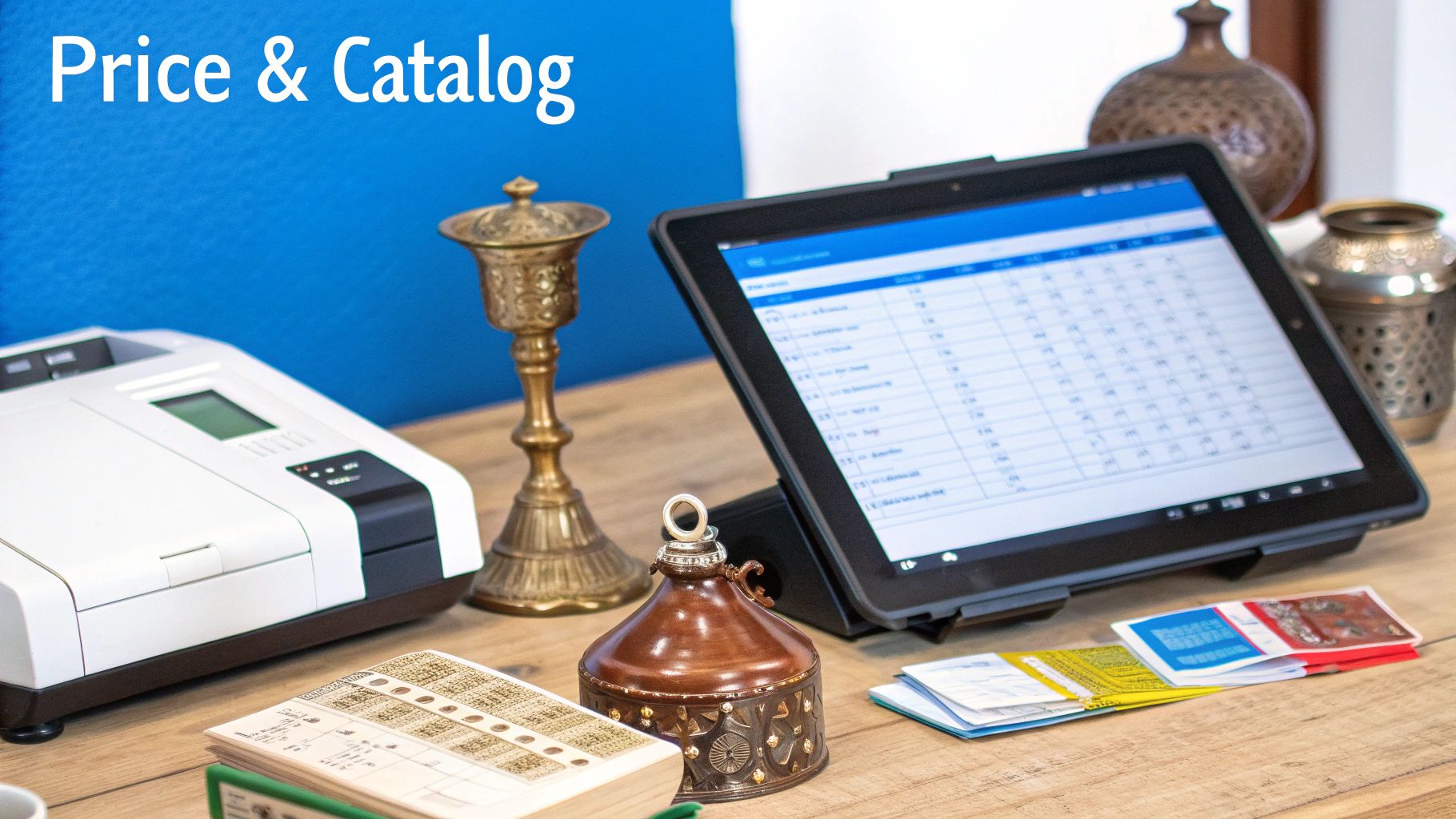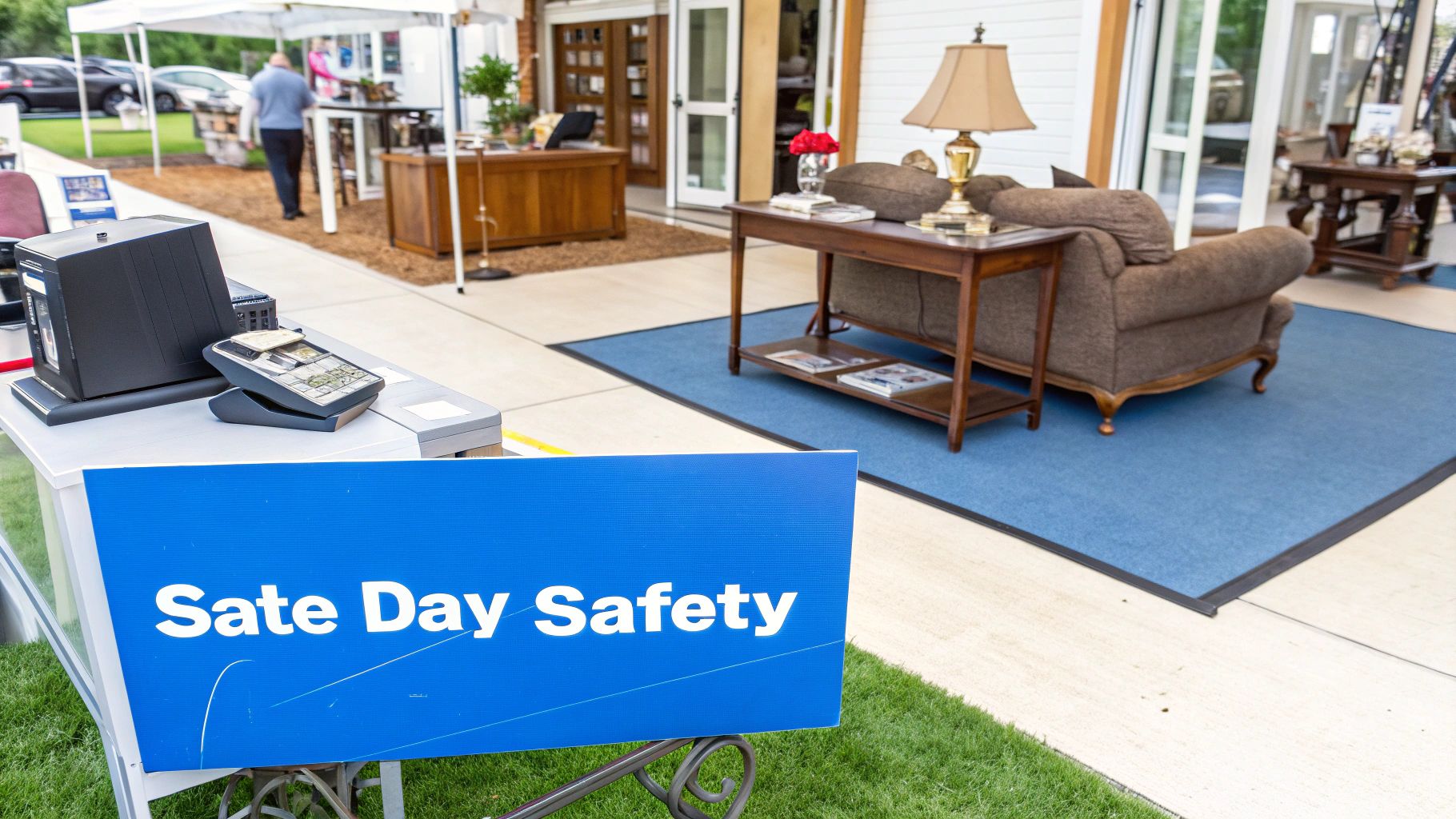Estate Sales in Jacksonville FL A Practical Guide

Let's be honest, tackling an estate sale in Jacksonville can feel like a monumental task. Whether you're downsizing your own home or navigating the complexities of a loved one's belongings, it's easy to feel overwhelmed. This guide is here to cut through the noise and give you a clear, practical roadmap for managing the entire process in today's local market—from permits and pricing to getting the word out and clearing the property.
Think of this as your step-by-step game plan for turning a daunting project into something not just manageable, but profitable.
Your Guide to Estate Sales in Jacksonville FL
An estate sale is so much more than a glorified garage sale. It’s the full liquidation of a home's contents, usually sparked by a major life event like a move, downsizing, or settling a family member's affairs. If you find yourself handling the last part, digging into a complete guide to settling an estate can provide some much-needed context before you even start sorting through items.
This guide is built from real-world experience, zeroing in on what you actually need to know to succeed right here in Jacksonville. We'll cover all the essentials:
- The specific rules and permit requirements in Duval County.
- How to build a realistic timeline and organize everything without losing your mind.
- Smart marketing strategies that attract serious local buyers.
- The logistics of running a smooth, safe, and secure sale weekend.
How the Jacksonville Market Affects Your Sale
It's smart to keep an eye on local real estate trends, as they can definitely influence your timing. The Jacksonville housing market has shifted recently, creating more of a buyer's market. This can affect how quickly the property itself sells after you've cleared it out.
As of June 2025, the number of active home listings in Northeast Florida shot past 12,000—that's a 13% jump from last year. This surge means homes are sitting on the market longer, which makes running an efficient and profitable estate sale more critical than ever for a smooth transition.
A well-planned estate sale isn’t just about selling things. It’s about creating a clean slate for whatever comes next, whether that’s selling the home or simply moving forward.
Understanding these market dynamics helps you set realistic goals from the start. By focusing on a successful liquidation, you can get the property ready for a competitive market and close this chapter with confidence.
Your Pre-Sale Planning Checklist
Let's be honest: a successful Jacksonville estate sale doesn't just happen. It’s built on a solid foundation of planning. The weeks leading up to the sale are every bit as important as the event itself. If you just jump in without a clear plan, you're setting yourself up for burnout, missed opportunities, and a ton of unnecessary stress.
Think of the next four to six weeks as your project runway. Breaking down the enormous task of liquidating a home's contents into smaller, weekly goals makes the whole thing feel much more manageable. This practical checklist covers those crucial first steps to get you organized from the get-go.
For a deeper dive, our complete estate sale checklist offers an even more granular breakdown of every single stage.
To help you visualize the process, here's a sample timeline we often recommend to folks in the Jacksonville area.
Jacksonville Estate Sale Planning Timeline
| Week | Key Tasks | Local Considerations (Jacksonville, FL) |
|---|---|---|
| Week 1-2 | Initial Sort: Go through every room. Create three piles: Keep, Sell, and Discard/Donate. | This is the toughest part emotionally. Pace yourself. Consider donating usable items to local charities like BEAM or Hubbard House. |
| Week 3 | Start Inventory: Begin making a list of significant items you plan to sell. No need for full details yet. | Focus on high-value items first: furniture, antiques, collectibles, electronics. This helps you gauge the sale's potential. |
| Week 4 | Check Local Rules: Investigate city, county, and any HOA regulations for estate sales. | Neighborhoods like San Marco, Riverside, or Mandarin often have strict HOA rules on sale duration and signage. Get these details now. |
| Week 5 | Pricing & Staging: Research prices for your inventoried items. Begin staging the home for photos. | Use online marketplaces to see what similar items are selling for locally. Good staging and clear photos are critical for online interest. |
| Week 6 | Marketing Push & Final Prep: Launch your sale online. Finalize details for the pickup day. | This is when you build excitement. We'll handle the broader marketing, but you can share the link with your local network, too. |
This timeline gives you a solid framework, but remember to stay flexible. Every estate is different, and you might need to adjust as you go.

As you can see from local data, the Jacksonville housing market can shift. When homes take a bit longer to sell, an efficient and well-planned estate clean-out becomes even more critical to keep your timeline on track.
Assemble Your Support Team
Here's a piece of advice I give everyone: you cannot—and should not—do this alone.
Assembling a reliable team is non-negotiable. It's the only way to keep the process running smoothly and prevent total overwhelm. Your "team" doesn't have to be professionals; it can be family members, trusted friends, or even hired help for specific things like moving that heavy armoire.
The key is to assign specific roles early on. Who is in charge of research and pricing? Who will manage the marketing and online listings? Who will be the point person on sale days? Clearly defined responsibilities prevent confusion and ensure all bases are covered.
By delegating tasks, you transform a solitary burden into a collaborative effort. Trust me, that's absolutely essential for keeping your momentum—and your sanity—intact.
Pricing and Cataloging Your Items
This is where the rubber meets the road. Getting the pricing right is what separates a wildly successful sale from a disappointing one. Proper pricing and cataloging aren't just busywork; they're the steps that turn a house full of stuff into a marketable inventory, especially when you're running an estate sale in Jacksonville, FL.
You’re not trying to get full retail prices here. The real goal is finding the fair market value—what an interested buyer in Jacksonville would actually pay for an item today. A great starting point is to do a little digital digging. Spend some time on eBay (make sure to filter for "sold" listings), browse Facebook Marketplace, and check out what local auction sites are getting for similar items right here in Northeast Florida.

This research phase is absolutely essential. An essential estate sale pricing guide can be a huge help, giving you a better feel for the nuances of setting competitive prices that still attract buyers.
Researching for the Jacksonville Market
Jacksonville has its own unique flavor. For instance, things with a coastal vibe, rattan furniture, and quality outdoor gear tend to move quickly. And with a huge military presence from NAS Jacksonville and Mayport, you'll often find a ready market for military memorabilia, old uniforms, and service-related collectibles.
Spend a weekend afternoon browsing the antique shops and consignment stores in neighborhoods like San Marco or Avondale. Pay attention to their price tags, but keep in mind their prices include rent and other overhead. A solid rule of thumb for an estate sale is to price your items at about 25-50% of what you'd see them for in a retail or antique store.
Pro Tip: Don't be afraid to bundle! Grouping everyday items like sets of glassware, linens, or paperback books into affordable lots is a fantastic way to move a lot of smaller things quickly. Bargain hunters love it.
Creating a detailed inventory list is non-negotiable. Seriously, do not skip this. A simple spreadsheet listing the item, a quick description, its condition, and your starting price is your best friend. It’s your primary defense against theft and makes post-sale accounting a breeze. For a deeper dive, check out our complete guide on pricing strategies for estate sales.
Knowing When to Call an Appraiser
Look, you can price most household goods on your own with a bit of research. But some items really need a professional eye. If you stumble across any of the following, it’s smart to bring in a certified appraiser before you slap a price tag on it:
- Fine Jewelry and Watches: Anything made of precious metals or featuring real gemstones.
- Original Artwork: Especially signed paintings, prints, or sculptures.
- Rare Collectibles: First-edition books, old coin collections, or valuable stamps.
- Designer & Antique Furniture: Pieces from well-known makers like Stickley, Herman Miller, or other iconic brands.
A professional appraisal ensures you don't accidentally sell a family heirloom for pennies on the dollar. It’s a small investment that can pay off big.
Marketing Your Sale to Local Buyers
You can have perfectly priced and cataloged items, but if nobody knows about your sale, you’ll be sitting alone with a house full of stuff. A phenomenal marketing plan is what transforms a well-organized event into a profitable one, filling your space with eager buyers.
Your goal is to create a buzz that reaches the right people at the right time. This means going way beyond a simple sign on the lawn. A modern strategy for a Jacksonville sale has to blend targeted online listings with effective, old-school physical signs. This combo ensures you capture everyone, from the dedicated shoppers who plan their weekends online to the casual passersby just driving through the neighborhood.
Creating Compelling Online Listings
Your online listing is the first impression most buyers will have of your sale, and you need to make it a great one. Don't skimp here—high-quality, well-lit photos are non-negotiable. They are the single most important tool you have for drawing in serious buyers.
Once you have your photos, it's time to post on the go-to platforms for Jacksonville shoppers.
- EstateSales.net: This is where the pros and seasoned enthusiasts live. A clear, detailed listing here is absolutely essential for reaching your most dedicated audience.
- Facebook Marketplace: It's perfect for showcasing individual big-ticket items. Think furniture, unique collectibles, or brand-name electronics. You can reach a massive local audience this way.
- Craigslist: It might feel a bit dated, but Craigslist still pulls in a surprising number of bargain hunters. It's a low-effort way to cast a wider net.
When you write your descriptions, get specific. Don't just say "lots of tools." Instead, try something like, "Huge collection of vintage Craftsman hand tools, newer Ryobi power tools, and a fully-stocked rolling tool chest." That kind of detail helps buyers find exactly what they’re looking for and signals that your sale is worth their time.
If you want to dive deeper into crafting the perfect ad, check out our detailed guide on how to advertise an estate sale.
Leveraging Physical Signage and Local Groups
Never, ever underestimate the power of well-placed signs. Your signs need to be bold, simple, and easy to read from a moving car. Think big, dark font on a bright background—like black on yellow or white—with a can't-miss-it arrow pointing the way.
But before you plaster the neighborhood, make sure you know the local rules. Some Jacksonville HOAs, especially in areas like Mandarin or along the Beaches, have strict regulations about the size, placement, and timing of signs. A quick check of the rules can save you a potential fine.
Place your signs at major intersections leading into your neighborhood on the morning of the sale—not days before. This creates a sense of immediate action and prevents them from being taken down or just becoming part of the landscape.
Finally, tap into the power of local online communities. Jacksonville is packed with neighborhood-specific Facebook groups for areas like Riverside, Avondale, San Marco, and the Northside. Posting a sneak peek of your best items in these groups a few days before the sale is a fantastic way to build local buzz and get people excited to show up on day one.
It's Go Time: Managing a Safe and Successful Sale Weekend

The doors are about to open. All your prep work has led to this moment, and now it’s all about execution. Your goal for the sale weekend is to transform your home into a space that’s both welcoming for shoppers and completely secure. A smoothly run event doesn’t just boost sales; it sidesteps the kind of chaos that can quickly derail all your hard work.
Before a single person steps inside, do one final walkthrough. Can people move around freely? Are the main walkways clear enough for two people to pass? If it feels tight, now is the time to shift things around. Use some simple rope or "Do Not Enter" signs to block off any rooms, closets, or bathrooms you want to keep off-limits.
Staffing and Securing Your Sale
You'll want a few extra hands on deck. For a standard three-bedroom house here in Jacksonville, having at least two or three people helping out is the sweet spot. This setup allows you to post one person near the door to greet people and answer initial questions, have another dedicated to the checkout table, and a third person acting as a "floater" to keep an eye on different rooms and help customers.
Security is everything. Position your checkout station near the main exit—this gives you a clear line of sight on everyone coming and going. For those small, high-value items like jewelry or collectibles, don't leave them out in the open. Keep them safe in a locked display case or behind the checkout table where you can show them to one interested shopper at a time.
Here's a tip I've learned from countless sales: Never leave the cash box unattended. Not even for a second. A locking cash box is good, but a fanny pack or apron with deep pockets is even better for keeping money on your person. It’s one of the simplest and most effective theft deterrents.
Fraud is also something to be mindful of. For cash transactions, it's wise to have a counterfeit detection pen for large bills; you can grab one at any office supply store. If you're taking digital payments, stick to reputable apps like Venmo or Cash App. And always, always confirm the payment has fully processed on your own device before the buyer walks away with their purchase.
Handling Payments and Pickups
Clear, simple policies will be your best friend when things get busy. Make a big, easy-to-read sign for your checkout table that lays out the rules.
- Payment Methods: Let everyone know right away if you’re cash-only or if you accept digital payments.
- Holding Items: People will inevitably ask you to hold something while they keep looking. The best way to handle this is to create a designated "Sold" table near the checkout. Give them a time limit—say, 30 minutes—before the item goes back on the floor.
- Pickup Policy: For bulky items like furniture, always require payment in full upfront. Be crystal clear about the pickup window (e.g., "Must be picked up before 4 PM on Sunday"). It's also crucial to state that buyers are responsible for bringing their own muscle, vehicle, and any necessary moving supplies.
Finally, don't underestimate the power of good customer service. A friendly, approachable attitude makes a huge difference. Be prepared to negotiate a little, but know your bottom line. When shoppers have a positive experience, they stick around longer and often buy more, which is the key to making your estate sale in Jacksonville, FL a resounding success.
Handling Unsold Items After the Sale
The doors have closed, and the last buyer has gone home. But the work isn't quite done yet. You’re probably looking at a collection of items that didn't sell, but don't think of this as a loss. This is your final chance to squeeze every bit of value out of the estate.
The biggest mistake I see people make is panicking and calling a junk hauler to clear everything out. It's fast, sure, but you're literally paying someone to take away items that still have value. A much smarter approach is to quickly sort what's left into a few key categories.
Options for Leftover Items
For the good stuff that just didn't find the right buyer—think high-quality furniture, art, or unique collectibles—don't give up on them. Local consignment is a fantastic next step.
Shops in Jacksonville neighborhoods like San Marco or Avondale are always on the lookout for quality pieces to add to their inventory. Consigning these items gives them a second life and another opportunity to sell, all without you having to manage the process directly.
For everything else, donation is your best friend.
- Help Your Community: Local Jacksonville charities like Hubbard House or BEAM (Beaches Emergency Assistance Ministry) do incredible work. They accept a huge range of household goods, clothing, and furniture, making sure your items go to people who truly need them.
- Don't Forget the Tax Write-Off: Your donations are tax-deductible. Always, always get a detailed receipt from the charity. This can turn into a surprising financial benefit when tax season rolls around.
This final clean-out phase is also critical for getting the property ready for its next chapter, whether it's being sold or rented. The Jacksonville real estate market moves quickly. For instance, recent data showed the average home value in the area was $281,507 in late 2025, with homes typically going under contract in about 51 days.
Having a solid plan for the leftovers means you can empty the property fast, getting it on the market without delay. You can dig deeper into these local housing trends on the St. Louis Fed's economic data site.
Your Top Jacksonville Estate Sale Questions Answered
When you're planning an estate sale, a million questions can pop into your head. It's totally normal. Here are some straightforward answers to the questions we hear most often from folks right here in Jacksonville.
Do I Really Need a Permit for My Estate Sale?
Good news on this front. For most residential estate sales, you won't need to get a special permit from the City of Jacksonville or Duval County. That's one less piece of red tape to worry about.
The real wildcard, however, is your Homeowners Association (HOA). If you're in a neighborhood like Fleming Island, Mandarin, or one of the communities along the Intracoastal, you absolutely have to check their rules first.
HOAs often have strict covenants about:
- How many days your sale can run.
- The specific hours you can operate.
- Where (and what size) you can place your advertising signs.
Trust me, a quick call to your HOA management company can save you a world of trouble and some hefty fines.
When’s the Best Time of Year to Hold My Sale?
You’ll get the best results by aiming for the fall through spring seasons—think anytime from October to May. The weather is just more pleasant, which naturally encourages more people to get out and shop. Plus, our seasonal residents (the "snowbirds") are in town, which instantly expands your pool of ready-to-buy customers.
One piece of pro advice: always check the local events calendar before picking your dates. If your sale is up against something huge like The Players Championship, the Jacksonville Jazz Festival, or even a Jaguars home game, you’ll lose a lot of your audience. Traffic gets snarled and people’s attention is elsewhere.
Should I Just Hire a Professional Estate Sale Company?
This is the big question for many people. Going with a traditional estate sale company can be a fantastic option if you’re pressed for time, trying to manage things from out of state, or just feeling completely overwhelmed. They’ll take care of everything, from staging the home to cleaning up afterward. For that service, you can expect to pay a commission of 30-50% of the total sales.
But what if you want to keep more of the profits? If you have the time and can rally some help from family or friends, running the sale yourself is the way to go. This is where a platform like DIYAuctions really shines. It gives you the powerful marketing and payment tools the pros use, but lets you keep up to 90% of the revenue. It’s the perfect middle ground—you stay in control without giving away a huge chunk of your earnings.